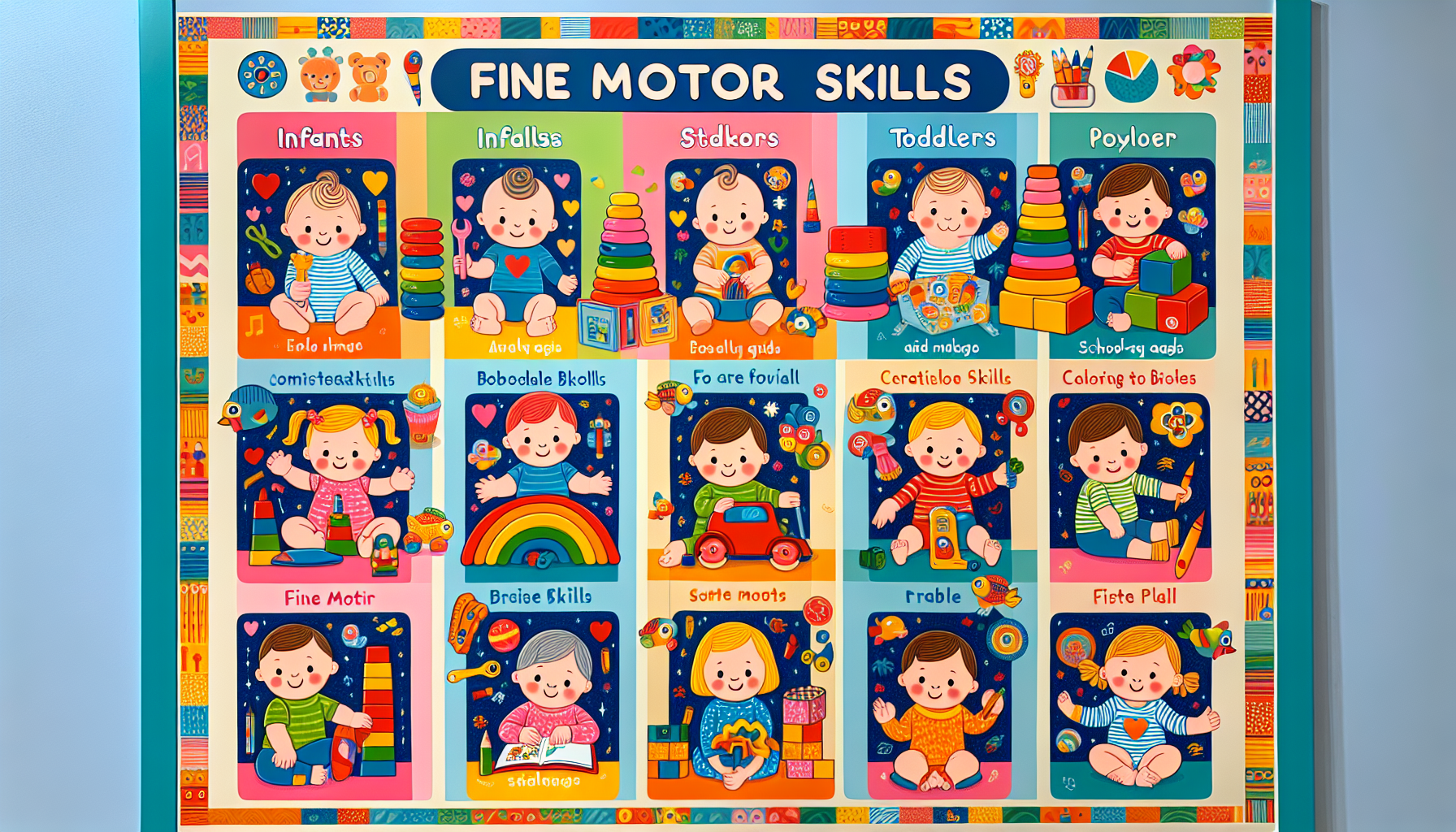Fine motor skills are essential for tasks requiring precise hand movements, such as writing or using utensils. This article discusses various fine skills examples and provides helpful activities to develop these skills in children at different ages.
Key Takeaways
- Fine motor skills involve small muscle movements and coordination, essential for tasks like writing, eating, and self-care.
- Development of fine motor skills begins in infancy and is crucial for a child’s independence and success in academic and social settings.
- Occupational therapy plays a key role in addressing fine motor skill challenges, providing tailored exercises to enhance children’s abilities and confidence.
What Are Fine Motor Skills?

Fine motor skills involve small muscles, precise movements related to the hands, fingers, feet, and toes. They require intricate coordination among muscles, joints, and nerves to perform tasks accurately and with control. Unlike gross motor skills, gross motor skills involve larger muscles and movements like walking or jumping, fine motor skills involve the smaller muscles responsible for more detailed actions.
Fine motor skills are crucial for many daily activities, including reaching, grasping, and manipulating objects. Buttoning a shirt or using a fork to eat dinner requires fine motor control. Even simple actions like brushing teeth or tying shoelaces rely on these precise movements.
Fine motor skills development begins in infancy and continues throughout life, from a baby’s first grasp to an adult’s ability to write or play a musical instrument.
Importance of Fine Motor Skills

Fine motor skills are not just about performing tasks; they are the building blocks of independence. The ability to perform self-care tasks, engage in hobbies, and complete school or work-related duties relies heavily on these skills. For example, a child learning to tie their shoelaces or use utensils during mealtime is developing essential fine motor control.
Tasks such as brushing teeth, eating, writing, and dressing involve precise hand movements crucial for personal hygiene, food preparation, and writing communication. Regular engagement in these activities strengthens children’s fine motor skills and overall dexterity.
Fine motor skills are integral to a child’s development, helping them achieve milestones and build confidence. As children grow, the complexity of tasks increases, making fine motor skills even more important for their academic and social success. Organizing small items and playing musical instruments are examples of how these skills contribute to a child’s growth and independence.
Examples of Fine Motor Skills by Age

Fine motor skills development begins at birth and continues throughout life, with children reaching developmental milestones at different ages, such as coloring, drawing, writing, grasping, and dressing.
Let’s delve into how these skills evolve at different stages of a child’s life.
Infants (0-12 Months)
Infants begin their fine motor skills journey with simple milestones. By 4-6 months, most children start grasping objects, bringing toys to their mouths, and using their index finger to point. These early actions are foundational for more complex skills that will develop later.
Tummy time during this stage helps infants strengthen neck and shoulder muscles, essential for fine motor development. Activities like finger feeding, where a child picks up food and brings it to their mouth, enhance grasping skills and hand-eye coordination.
Toddlers (1-2 Years)
Toddlers develop more advanced fine motor skills, marking an important stage in their growth. They begin to stack blocks, turn pages of a book, and manipulate small objects, which are both fun and crucial for motor skills development, as they learn to balance and coordinate movements.
Activities like peeling stickers help toddlers refine their pincer grasp, essential for tasks such as buttoning clothes. These playful yet purposeful activities help toddlers build the strength and coordination needed for more complex fine motor tasks.
Preschoolers (3-5 Years)
In preschoolers, fine motor skills become even more important as they prepare for school. They should be able to hold a pencil or crayon, cut with scissors, and manipulate small objects. Activities such as drawing, cutting with scissors, and buttoning clothes help refine these skills.
Tasks like stringing beads or Cheerios enhance visual motor coordination and require both hands, fostering bilateral integration. These activities improve fine motor control while promoting creativity and independence.
School-Age Children (6+ Years)
As children reach school age, their fine motor skills further evolve. They engage in more complex tasks that require greater precision, such as writing, playing musical instruments, and using utensils. These activities refine their fine motor control and dexterity.
The increasing complexity of tasks at this stage demands more refined skills. Playing musical instruments requires precise finger movements and coordination, further enhancing fine motor abilities.
Activities to Develop Fine Motor Skills

Developing fine motor skills can be enjoyable with a variety of age-tailored activities. From tummy time for infants to arts and crafts for preschoolers, these activities enhance fine motor control and coordination.
Tummy Time and Play Mats
Tummy time, where infants are placed on their stomachs while awake, is fundamental for infants. This practice helps develop head and neck control, essential for fine motor skills. Tummy time encourages infants to push up, roll over, and reach for toys, facilitating muscle development and coordination.
Interactive play mats offer a safe and stimulating environment for tummy time activities. These mats feature different textures, sounds, and toys that encourage reaching and grasping, enhancing fine motor skill development.
Arts and Crafts
Arts and crafts are excellent for developing fine motor skills in children. Activities like drawing, cutting with scissors, and playing with play-dough improve fine motor control and dexterity. Preschoolers enhance their fine motor skills by engaging in tasks like drawing, cutting, and buttoning clothes.
These activities improve fine motor movements and encourage creativity and problem-solving skills. Occupational therapists recommend crafts, play-dough, and bead stringing to enhance fine motor abilities.
Everyday Tasks
Incorporating everyday tasks into a child’s routine significantly contributes to building fine motor skills. Activities like using scissors to cut, stringing beads, and manipulating clay effectively develop fine motor abilities. These tasks refine children’s hand-eye coordination and dexterity.
Daily tasks such as dressing, feeding, and organizing small objects provide practical opportunities to strengthen fine motor skills. Encouraging children to participate in these activities helps build independence and confidence.
Challenges in Fine Motor Skill Development
Developing fine motor skills can come with challenges. Various conditions can interfere with fine motor movements, ranging from mild to severe.
Early intervention is essential for a child’s overall growth and independence.
Identifying Fine Motor Skill Difficulties
Early identification of fine motor skill difficulties is crucial. Children who struggle with manipulating objects or completing precise tasks may have a child’s fine motor skills difficulties. Recognizing these challenges and seeking help when needed is important. If your child isn’t meeting fine motor skill milestones, consult their healthcare provider.
Parents and caregivers should monitor their child’s progress and consult a pediatrician if they notice any motor skills development issues. Early intervention can significantly address these challenges.
When to Consult an Occupational Therapist
Consulting an occupational therapist can be beneficial if you are concerned about your child’s fine motor skills. Occupational therapists are trained to assess and address fine motor skill challenges, helping children develop necessary daily task skills. Significant delays or regression in milestones warrant professional help.
If you are worried about your child’s milestones or notice regression, consult your healthcare provider about starting occupational therapy. Occupational therapy offers targeted exercises and strategies to improve fine motor skills and enhance development.
Role of Occupational Therapy in Improving Fine Motor Skills

Occupational therapy is vital for addressing fine motor skill challenges. Therapists tailor exercises to meet each child’s specific deficits and abilities. The goal is to link therapy activities to everyday tasks, making exercises relevant and practical.
Occupational therapists provide ideas, exercises, and tools for home use, enabling parents to support their child’s development outside therapy sessions. These strategies help children improve fine motor control and coordination, fostering independence and confidence.
A personalized approach is crucial. Each child is unique, and occupational therapists work closely with families to develop strategies that cater to the child’s needs, ensuring optimal progress.
Summary
In summary, fine motor skills are essential for performing daily tasks and achieving independence. From infancy through school age, children develop these skills through various activities and milestones. Understanding the importance of fine motor skills and providing opportunities for development can significantly enhance a child’s overall growth and independence.
If you notice any challenges in your child’s fine motor skills, early intervention and consultation with an occupational therapist can make a profound difference. By incorporating practical activities and seeking professional help when needed, you can support your child’s journey towards mastering fine motor skills and achieving their full potential.
Frequently Asked Questions
What are fine motor skills?
Fine motor skills are critical for performing small, precise movements with the hands and fingers, which are essential for activities such as writing and manipulating objects. Developing these skills is important for everyday tasks and overall dexterity.
Why are fine motor skills important?
Fine motor skills are essential as they facilitate daily activities and promote self-care and independence. Mastery of these skills enables individuals to perform tasks such as eating, dressing, and personal hygiene effectively.
How can I help my child develop fine motor skills?
To help your child develop fine motor skills, engage them in arts and crafts, everyday tasks, and exercises recommended by occupational therapists. These activities can significantly enhance their dexterity and coordination.
What should I do if my child has difficulty with fine motor skills?
If your child has difficulty with fine motor skills, it is important to consult a healthcare provider or occupational therapist for guidance and support. Early intervention can significantly benefit your child's development.
What is the role of occupational therapy in fine motor skills development?
Occupational therapy plays a crucial role in enhancing fine motor skills by offering personalized exercises and strategies that help individuals improve their coordination and independence. This targeted intervention fosters confidence and encourages participation in everyday activities.
Original content from the Upbility writing team. Reproduction of this article, in whole or in part, without credit to the publisher is prohibited.









